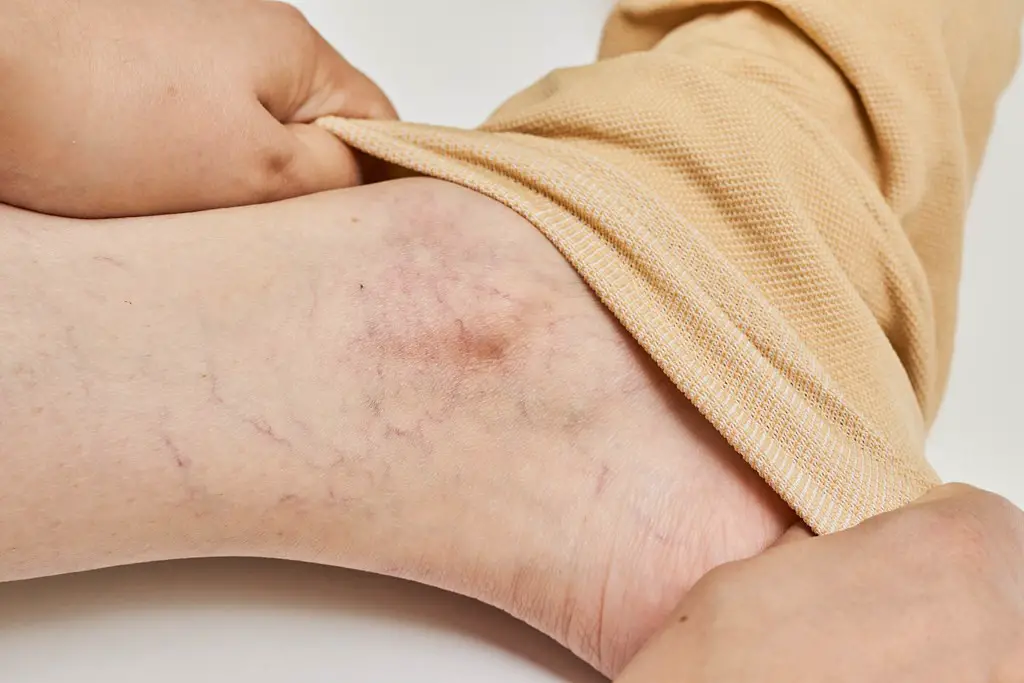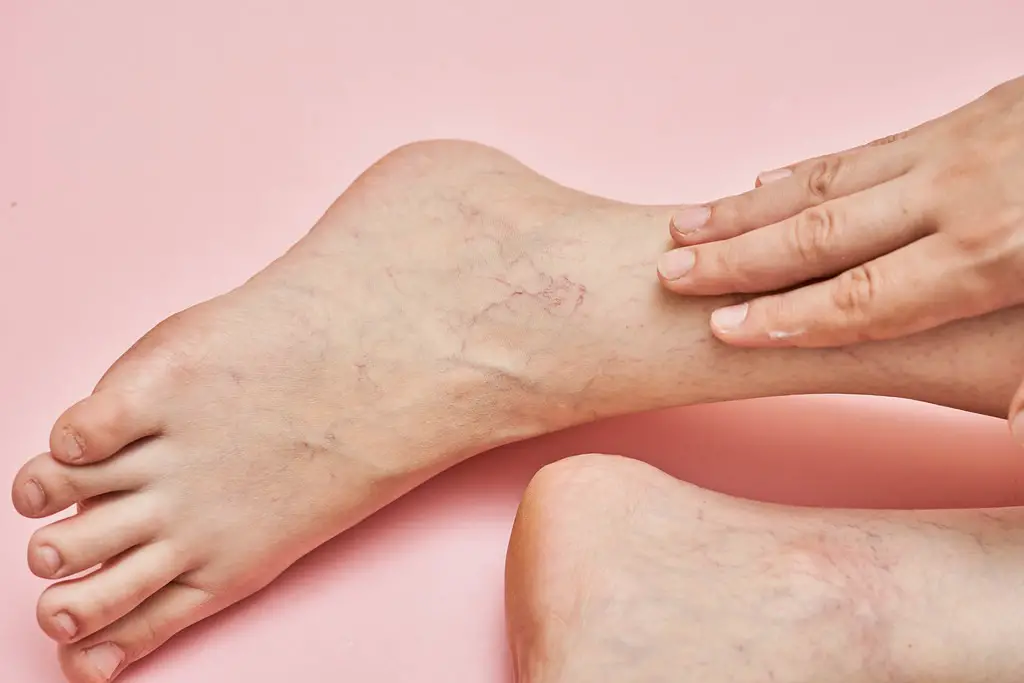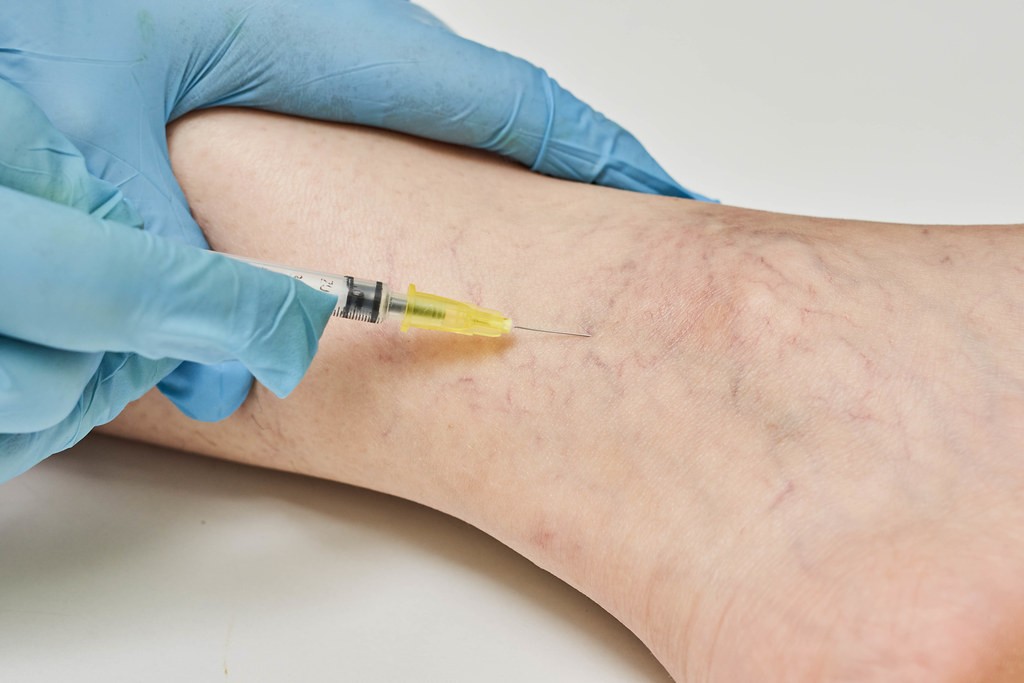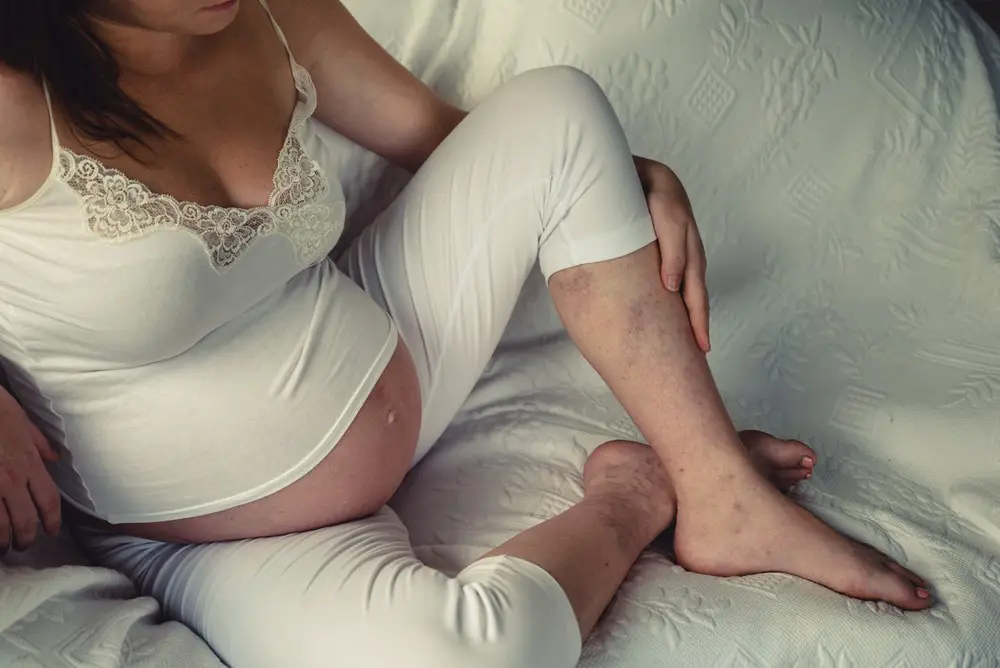As a BetterHelp affiliate, we receive compensation from BetterHelp if you purchase products or services through the links provided
Do you have varicose veins? Varicose veins occur when blood cannot properly return to the heart; raising your legs while sleeping will improve blood flow. If so, you may be wondering how to sleep with them. Unfortunately, it can be challenging to get a good night’s sleep when you have this condition. In this article, we will discuss tips that can help make sleeping with varicose veins easier.
Why Do Varicose Veins Hurt Most At Night?
There are a few reasons why varicose veins can be more painful at night. For one, you are likely to lie down for a long time when you sleep. This can cause the blood in your veins to pool and increase the pressure on your vessels. Additionally, gravity is not working in your favor when you are lying down. This can also contribute to the pain and discomfort that you may feel.

Here are a few tips that may help you get a better night’s sleep:
- Use pillows to elevate your legs. This will help reduce the pressure on your veins and may help alleviate some of the pain.
- Wear compression stockings. These stockings impose gentle pressure on your legs and can improve blood circulation.
- Avoid crossing your legs. This can cause the blood in your veins to pool and worsen your symptoms.
- Try to sleep on your side or stomach. Sleeping on your back can worsen the pain of varicose veins.
If you follow these tips, you may find that sleeping with varicose veins is a bit easier. But, of course, if you are still having difficulty, be sure to talk to your doctor about other treatment options that may be available to you.
Varicose Vein Symptoms
The most common symptom of varicose veins is pain. This pain is usually worse at night. Other symptoms may include:
- Swelling in your legs
- Leg Pain
- Itchy skin around the affected area
- Vein Disease
- Restless leg syndrome
- Skin ulcers
If you are experiencing any of these symptoms, talk to your doctor. Varicose veins can also lead to more severe problems such as blood clots and ulcers.

How To Sleep Better With Varicose Veins?
If you have varicose veins, you may find it difficult to sleep through the night. This can be especially true if your varicose veins are painful. Here are some tips to help sleep with varicose veins a bit easier.
Change Your Sleeping Position:
If you typically sleep on your back, try sleeping on your side or stomach instead. This can help reduce the pressure on your veins and may lessen your pain.
Elevate Your Legs:
Use pillows to prop up your legs while you sleep. This will help reduce the pressure on your veins and improve blood circulation.
Wear Compression Stockings:
These stockings apply gentle pressure to your legs and help blood flow. They are especially beneficial if you plan on being active during the day.
Avoid Crossing Your Legs:
Crossing your legs can cause the blood in your veins to pool and worsen your symptoms. So try to keep them uncrossed as much as possible, even when you’re not sleeping.
Exercise More:
Exercise can help improve blood circulation and reduce varicose veins’ pain. Try to get at least 30 minutes of moderate exercise each day.
Stretch More:
Stretching can also help improve blood circulation and reduce varicose veins’ pain. However, be sure to warm up before stretching to avoid injury.
Wear Compression Stockings:
Compression stockings are a type of stocking that applies gentle pressure to your leg veins. They can help with blood flow and may reduce the pain of varicose veins.
Get Hydrated:
Dehydration can make the pain of varicose veins worse. So be sure to drink plenty of fluids, especially water, throughout the day.
If you follow these tips, you may find that sleeping with varicose veins is a bit easier.
Drink Milk Before Bedtime:
A glass of warm milk before bedtime can help you sleep better and ease the pain of varicose veins.
If you follow these tips, you may find it easier to sleep through the night despite having varicose veins. However, if you’re still having difficulties, be sure to talk to your doctor about other treatment options that may be available to you.
How Do Varicose Veins Impact Sleep?
Varicose veins can cause several issues that make it difficult to sleep through the night. For one, they can be painful, making it hard to find a comfortable position. Additionally, varicose veins can cause restless legs syndrome (RLS), which can make it difficult to fall asleep in the first place. Finally, varicose veins can lead to leg cramps, which can also disrupt your sleep.
If you are struggling to sleep due to varicose veins, there are some things you can do to improve the situation. First, try elevating your legs when you sleep. This will help reduce the pain and swelling associated with varicose veins. Additionally, wear compression stockings during the day to help with blood flow. Finally, exercise regularly and often stretch to improve circulation. If you still have difficulty sleeping, talk to your doctor about other treatment options that may be available.

What Makes Varicose Veins Worse?
There are a few things that can make varicose veins worse. First, standing or sitting for long periods can cause the blood in your veins to pool and may increase pain and swelling. Additionally, pregnancy, being overweight, and having a family history of varicose veins can all contribute to the development of varicose veins. Finally, wearing tight clothing or shoes can also worsen symptoms.
Prolonged Sitting Or Standing:
This causes the blood in your veins to pool and may increase pain and swelling.
Pregnancy:
The added weight during pregnancy can cause varicose veins.
Being Overweight:
This increases the pressure on your veins and makes it more difficult for blood to circulate properly.
Family History:
If you have a family member with varicose veins, you are more likely to develop them yourself.
Tight Clothing Or Shoes:
Wearing tight clothing or shoes can constrict your veins and make symptoms worse.
Obesity And Poor Diet:
Carrying excess weight puts strain on your veins and makes it harder for blood to circulate properly. Additionally, a poor diet can contribute to the development of varicose veins.
While there is no surefire way to prevent varicose veins, there are some things you can do to reduce your risk. First, avoid prolonged sitting or standing. If you must sit or stand for long periods, take breaks often to move around and stretch. Additionally, maintain a healthy weight and eat a balanced diet. Finally, wear loose-fitting clothing and comfortable shoes. If you do develop varicose veins, there are treatments available that can help improve the symptoms.
Varicose veins can be painful and disruptive to your sleep. However, there are things you can do to ease the pain and help you sleep better. First, try elevating your legs when you sleep. Additionally, wear compression stockings during the day and exercise regularly to improve circulation. If you are still having difficulty sleeping, talk to your doctor about other treatment options that may be available.
Natural Remedies For Varicose Veins
If you are looking for natural remedies to help with the pain of varicose veins, there are a few options. First, try taking a warm bath before bedtime. This can help relax your muscles and ease the pain. Additionally, massage your legs with lotion or oil before bedtime. This can also help relax your muscles and reduce pain. Finally, eat foods that are high in fiber to improve circulation. Foods such as leafy greens, citrus fruits, and whole grains are all excellent choices.
Final Words
If you are struggling with varicose veins, there are things you can do to ease the pain and improve your sleep. First, try elevating your legs when you sleep. Additionally, wear compression stockings during the day and exercise regularly to improve circulation. If you are still having difficulty sleeping, talk to your doctor about other treatment options that may be available. Natural remedies such as taking a warm bath or eating foods high in fiber can also help reduce symptoms.
Articles You Might Enjoy Reading
Why We Catastrophize and What to Do Instead
How to Use Meditation to Boost Sports Performance (Simple Guide for Athletes)
11 Best Smartphone Apps to Monitor Your Mental Health And Wellbeing
Can Reiki Help You Cope with Stress And Anxiety?
7 Ways to Immediately Stop Worrying About the Future
- Left Arm Pain and Anxiety: Understanding the Relationship - November 23, 2023
- Anxiety Paralysis: Coping with Overwhelming Stress - November 23, 2023
- Anxious vs. Nervous: Differentiating Emotions and Responses - November 15, 2023
This site contains affiliate links to products. We will receive a commission for purchases made through these links.



